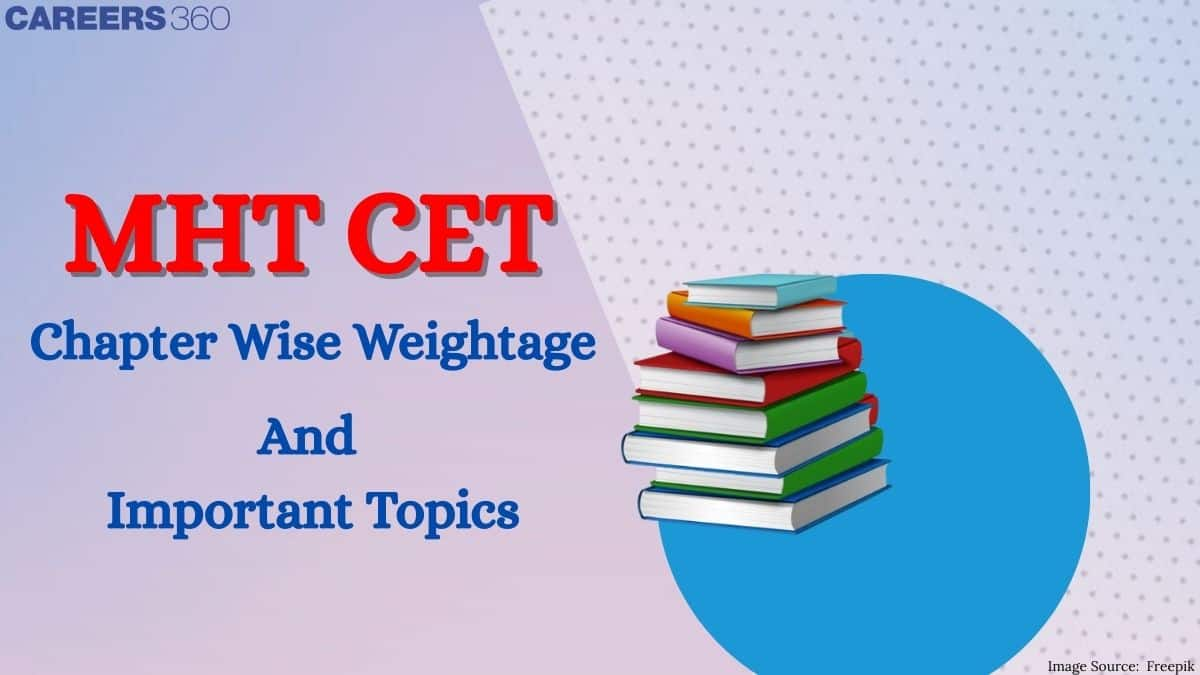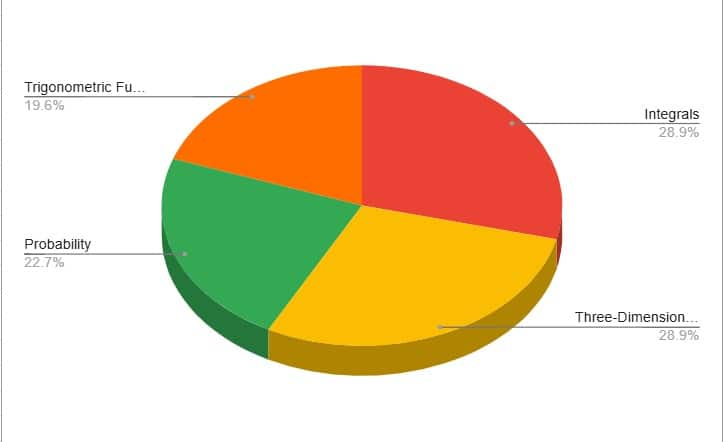MHT CET 2026 Important Topics and Chapter Wise Weightage - Key Areas to Focus On
MHT CET 2026 Important Topics and Chapter Wise Weightage - Focussing on weightage of chapters and topics is a great way for preparation of Maharashtra Health and Technical Common Entrance Test. In any competitive exam there are some chapters that have more weightage than others. As a serious candidate you should focus on those chapters and prioritize them to increase your chances of getting a good rank. Therefore, for MHT CET exam 2026, you should go through the syllabus with weightage to understand the important chapters and topics for the exam. In this article we have provide the MHT CET chapter-wise weightage PCM based on the analysis of previous years’ exams. Knowing which chapters carry more weight will help candidates focus on the most important areas during preparation. By carefully reviewing the important topics and chapters, aspirants can build a smart preparation strategy to score well in the exam. The MHT CET 2026 exam is expected to be held in April, 2026 and May,2026 - now on twice every year.

MHT CET 2026 Important Topics
Many questions in MHT-CET are similar to the JEE main 2026 syllabus topics Candidates need to check out the MHT CET chapter-wise weightage PCM of important chapters and topics for science subjects and focus according to their current level of preparation. Given below are the subject-wise segregated MHT CET 2025 important topics.
MHT CET Important Topics for Physics | Important Topics of Chemistry for MHT CET | MHT CET 2025 Important Topics of Mathematics |
|
|
|
MHT CET 2026 Chapter-Wise Weightage
According to the syllabus for MHT CET 2026, there are 80% of topics from class 12 topics while 20% of topics are from class 11 syllabus. However, when it comes to practically studying, sometimes candidates have less time to devote and look for topics that possess more weightage, so that even if they put in less time, they may be able to score a respectable grade. Thus, to know the MHT CET PCM chapter-wise weightage and MHT CET PCB chapter-wise weightage, candidates may check out the table below:
MHT CET 2026 High Weighted Chapter for Mathematics
Students can check the Maths MHT CET chapter-wise weightage 2026 in the list below.
Topic | Class | Weightage | Units/Chapters |
Integrals | 12 | 11.2% (28 questions) | Integration |
Three-Dimensional Geometry | 12 | 11.2% (28 questions) | Three-Dimensional Geometry |
Probability | 11 | 8.8% (22 questions) | Probability, Statistics, and Distribution |
Trigonometric Functions | 11 | 7.6% (19 questions) | Trigonometric Functions |

MHT CET 2026 High Weighted Chapter for Chemistry
Below is the list where candidates can verify the Chemistry MHT CET chapter-wise weightage 2026.
Topic | Class | Weightage | Units/Chapters |
P-Block Elements | 11 | 8.4% (21 questions) | p-Block Elements |
Solutions | 12 | 7.2% (18 questions) | Solutions and Colligative Properties |
Thermodynamics | 11 | 7.6% (18 questions) | Chemical Thermodynamics and Energetics |
Electrochemistry | 12 | 7.2% (18 questions) | Electrochemistry |
Aldehydes, Ketones, and Carboxylic Acids | 12 | 7.6% (16 questions) | Alcohols, Phenols, and Ethers |
Related links:
MHT CET 2026 High Weighted Chapter for Physics
In the table below, aspirants can find the MHT CET physics chapter-wise weightage.
Topic | Class | Weightage | Units/Chapters |
Waves | 11 | 7.6% (19 questions) | Wave Motion, Stationary Waves |
Oscillations | 11 | 7.2% (18 questions) | Rotational Motion, Oscillations |
Wave Optics | 12 | 7.2% (18 questions) | Electrostatics, Magnetic Effects of Current |
Kinetic Theory of Gases | 12 | 7.6% (18 questions) | Thermal Properties of Matter |
Electrostatics | 12 | 8.4% (21 questions) | Electrostatics |
.png)
MHT CET Chapter-wise Weightage 2026 for Biology
The list below contains information about the Biology high-weightage chapters for MHT CET 2026 that candidates can examine.
Botany | |
MHT CET Topics | Weightage |
Plant Diversity | 12% |
Plant Anatomy | 4% |
Plant Morphology | 7% |
Cell Biology & Cell Division | 10% |
Bio-molecule | 3% |
Plant Physiology | 13% |
Plant Reproduction | 9% |
Genetics & Biotechnology | 24% |
Biology in Human Welfare | 2% |
Ecology | 16% |
Animal Diversity | 10% |
Animal Tissue | 3% |
Structural Organisation in Animals | 2% |
Human Physiology | 45% |
Human Reproduction & Reproductive Health | 18% |
Origin & Evolution | 10% |
Animal husbandry | 3% |
Human Health & Diseases | 9% |
Frequently Asked Questions (FAQs)
No, a well-rounded preparation strategy should include understanding concepts, regular practice, and taking mock tests in addition to considering chapter-wise weightage.
Understanding chapter-wise weightage helps you allocate your study time effectively, focusing on topics that are more likely to appear in the exam.
The official chapter-wise weightage is typically not released by exam authorities. However, you can find estimates and guidance from reliable exam preparation resources.
To prepare effectively, focus on understanding concepts thoroughly, practice with previous year's questions, and consider seeking help from teachers or tutors if needed.
Look for reputable exam preparation books, online courses, and coaching institutes that often provide insights into chapter-wise weightage based on previous exams.
While it's essential to prioritize higher-weightage chapters, it's also a good practice to have a basic understanding of other chapters to ensure comprehensive preparation.
Topics like calculus, algebra, and mechanics often have a higher weightage in MHT CET exams. However, this can vary from year to year.
Popular Courses and Specializations
List of colleges accepting MHT CET
Browse Engineering Colleges by State
Questions related to MHT CET
On Question asked by student community
Hello,
MHT-CET is a computer based test conducted only at allotted exam centers, not from home or personal PCs, Students from outside Maharashtra can appear for the exam at selected centres during application. Non-Maharashtra candidates usually can't claim state quota seats through CAP and often use JEE Main scores instead.
HEY THERE!!!
The official website for MHT CET (Maharashtra Common Entrance Test) is:
- https://cetcell.mahacet.org
- All official information about MHT CET 2025 is available here, including application forms, admit cards, answer keys, results, and counseling information.
I GOT 72 persentile (GOBCH) in MHTCET and I want to pursue BTech CSE, AI, AI-DS,ai-ml,IT, (anyone) so which college can I get in Pune
Hey,
As per the MHT CET syllabus 2024 with weightage PCM and PCB prescribed by the Maharashtra CET Cell, 20 percent weightage is given to the Class 11 topics and the remaining 80 percent to the Class 12 topics of the Maharashtra board.
For detailed information about weightage chapter wise
Hello aspirant,
Certainly, admission to Bachelors in Physiotherapy (BPT) programs is possible through the MHT CET Exam by meeting the necessary cutoff. If you are a Maharashtra resident with a valid domicile, you are eligible to take the MHT CET exam for BPT admission. Alternatively, NEET and CET exams are

